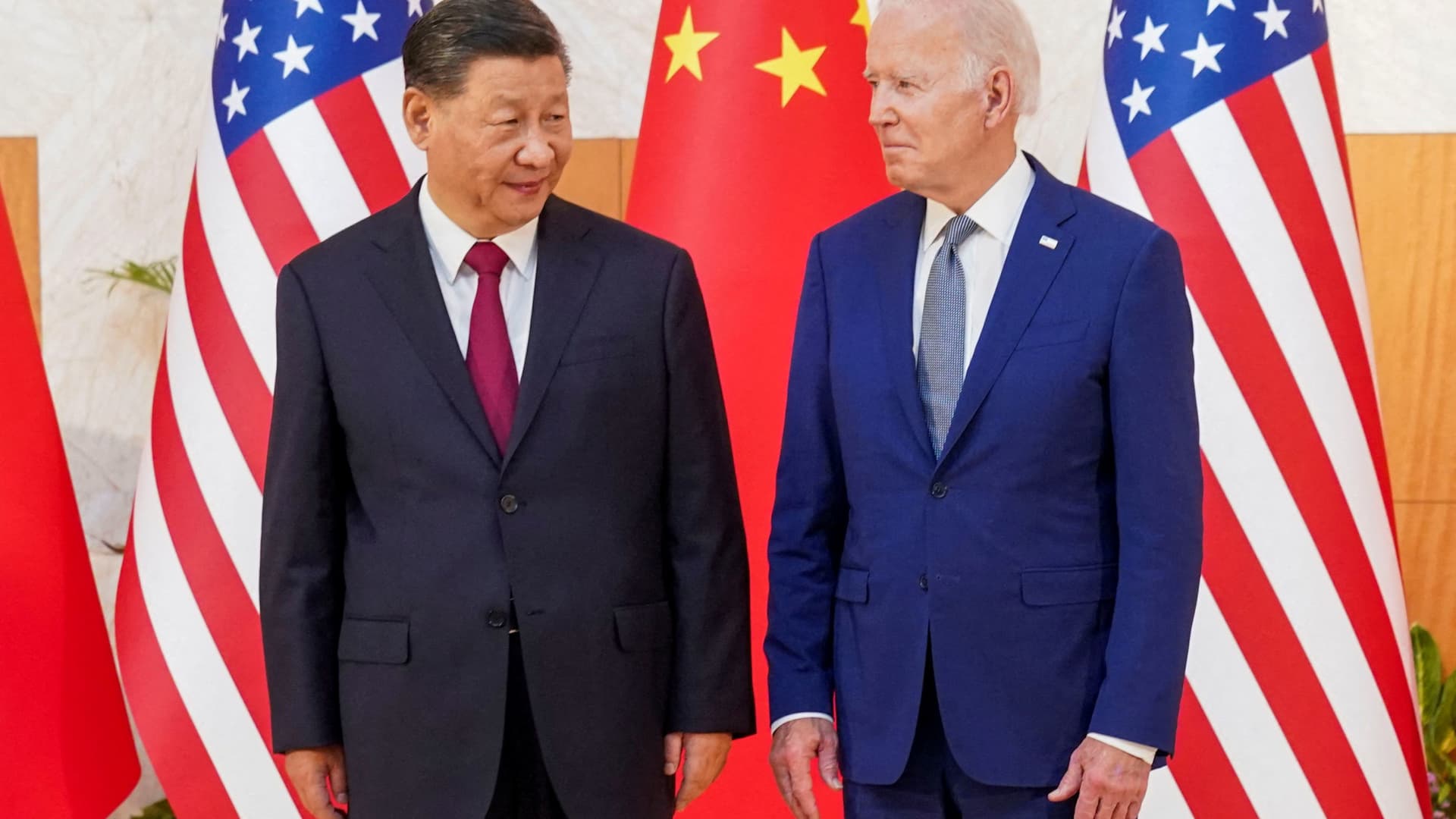U.S. President Joe Biden meets Chinese President Xi Jinping on the sidelines of the G-20 leaders’ summit in Bali, Indonesia, on Nov. 14, 2022.
Kevin Lamarque | Reuters
The Biden administration announced stiff new tariff rates Tuesday on $18 billion worth of Chinese imports. The White House said the tariff hikes were necessary to protect American industries from unfair competition.
Starting this year, President Joe Biden will quadruple tariffs on imported Chinese electric vehicles, from 25% to 100%. The import tax on Chinese solar cells will double, from 25% to 50%. And tariffs on some Chinese steel and aluminum imports will increase more than three-fold, from 7.5% today up to 25%.
The president also directed U.S. Trade Representative Katherine Tai to more than triple the tariff rates on lithium-ion batteries for EVs and lithium batteries meant for other uses. Starting in 2025, tariffs on imported Chinese semiconductors will jump from 25% to 50%.
First-time tariffs will be imposed on Chinese imports of medical needles and syringes, as well as massive ship-to-shore cranes, the White House said in a fact sheet. Chinese rubber medical gloves and some respirators and face masks will also be hit with higher tariff rates.
Some items, like batteries and natural graphite, will have longer phase-in periods for tariffs.The White House said this is partly to give the U.S. manufacturing sector time to scale up to a point where enough batteries are being produced domestically to meet consumer demand.
“China is producing at a rate and with a trajectory that’s far in excess of any plausible estimate of global demand,” a senior administration official said on a Monday call with reporters.
“That is going to flood the global market with supply that undercuts our ability to build productive capacity at home and … leaves all of us across the world more vulnerable to economic coercion,” said the official.
Warning signs
White House officials across a variety of agencies have raised concerns in recent weeks about China’s domestic subsidies for clean energy manufacturing.
They believe Beijing’s subsidies are helping companies overproduce cheap clean energy products like solar panels and electric vehicles that outpace domestic demand.
If companies cannot sell that surplus domestically, U.S. officials warned, they could end up dumping them on global markets, making it hard for nascent clean energy industries in other countries to complete.
“China’s overcapacity distorts global prices and production patterns and hurts American firms and workers, as well as firms and workers around the world,” Treasury Secretary Janet Yellen said in March ahead of her visit to China where she confronted government officials on the issue.
Xinhua, the Chinese government news agency, called Yellen’s claims “unfounded,” and “a reflection of the zero-sum mindset of some policymakers in Washington.”
Political stakes
The new trade restrictions come during the White House’s official “Infrastructure Week,” as Cabinet officials travel around the country touting Biden’s massive infrastructure and clean energy investments.
Many of these investments are still in the early stages of implementation, however. The tariffs announced Tuesday are intended to help prevent a rush of cheap Chinese goods from impeding America’s progress on clean energy.
U.S. Trade Representative Katherine Tai addresses the media during the Indo-Pacific Economic Framework meeting in Detroit, Michigan May 27, 2023.
Rebecca Cook | Reuters
“The Chinese have been investing in their electric vehicle domestic industry [with] the range of unfair practices that are giving them a significant onset, pricing, competitive advantage,” an administration official said.
“It was important for us to ensure that given their rapidly growing exports, and excess capacity in the sector, that we put in the right safeguards,” the official added.
There are likely other factors at play beyond simple protectionism. The future success of Biden’s public investments in green energy, semiconductors and traditional infrastructure are a major part of his argument for reelection in November.
Biden and presumptive Republican nominee Donald Trump have both adopted tough-on-China foreign policy platforms. And each has a record in the Oval Office to back it up.
‘No inflationary impact’
While hiking China tariffs helps Biden maintain his hawkish stance, analysts have warned of unintended consequences that new import taxes can have on the domestic economy and individual consumers.
Goldman Sachs, for example, previously estimated that every percentage point increase in the effective tariff rate would decrease gross domestic product by 0.03%, increase consumer prices by 0.1% and heat up inflation for one year.
The Biden administration has so far maintained that these tariffs will have “no inflationary impact” because they are not “across the board” of the economy and they only target specific sectors, a senior administration official said on the Monday call.
That stands in contrast to Trump’s campaign proposals, which call for an indiscriminate 10% tariff across all imports.
U.S. President Donald Trump and China’s President Xi Jinping at the G20 leaders summit in Japan on June 29, 2019.
Kevin Lamarque | Reuters
Consumers can expect “no increases on costs” from Biden’s new tariffs, the senior official added on Monday.
“What Americans can expect is that the investment that is underway, that is fueling record levels of jobs in manufacturing and factory construction will continue,” the official said. “These tariffs will protect and safeguard those gains.”







